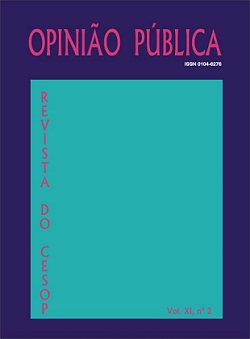Resumo
A relação entre o comportamento da elite política e as preferências gerais da população está no cerne de discussões sobre democracia representativa. Porém, pouco se sabe sobre quem influencia quem e quanto tempo demora para que tal influência seja sentida. Este artigo apresenta resultados a partir de um conjunto de dados organizados em série temporal que permite verificar a relação entre o clima da opinião pública, a escolha presidencial de instrumentos de governo (legislação extraordinária versus ordinária) e o apoio do congresso às iniciativas dos presidentes no Brasil. Foram coletadas observações mensais sobre a popularidade do presidente, padrões de votação nominal no congresso e uso de medidas provisórias, e da legislação comum, pelo executivo. Esse conjunto de dados permitiu testar, usando técnicas de séries temporais, o impacto dessas variáveis umas sobre as outras e a defasagem temporal necessária para que esses impactos se tornem significativos.
Abstract
The relationship between elite behavior and mass preferences is in the essence of discussions about representative democracy. However, very little is known about who influences whom and how long it takes for such influence to be felt. This article presents results from a time-series dataset that allows us to verify the relationship between the mood of public opinion, presidents’ choice of policy making instrument (extraordinary vs. ordinary legislation) and congressional support to presidents’ policy initiatives in Brazil. We collected monthly observations of presidential popularity, patterns of roll-call voting in congress and presidents use of “medidas provisórias” as well as regular legislation. This dataset allows us to test, using time-series techniques, the impact of these variables on each other and the amount of lags it takes for these impacts to become significant.
Keywords: public opinion, executive, legislative, time-series.
Referências
ABRANCHES, S. Presidencialismo de coalizão: o dilema institucional brasileiro. Dados, v. 31, n. 1, p. 5-38, 1988.
AMES, B. The deadlock of democracy in Brazil. Ann Arbor: University of Michigan Press, 2001.
AMORIM NETO, O. Presidential cabinets, electoral cycles, and coalition discipline in Brazil. In: MORGENSTERN, S.; NACIF, B. (ed.). Legislative politics in Latin America. New York: Cambridge University Press, 2002.
AMORIM NETO, O. et al. Agenda power in Brazil’s Camara dos Deputados, 1989-98. World Politics, n. 55, p. 550-578, jul. 2003.
BREHM, J. The phantom respondents. Ann Arbor: University of Michigan Press, 1993.
DENZAU, A. T.; MUNGER, M. C. Legislators and interest groups: how unorganized interests get represented. American Political Science Review, v. 80, n. 1, p. 89-106, 1986.
DORNBUSCH, R.; EDWARDS, S. The macroeconomics of populism. In: DORNBUSCH, R. EDWARDS, S. (ed.) The macroeconomics of populism in Latin America. Chicago: The University of Chicago Press, 1991.
EDWARDS, G.; WOOD, B. D. Who influences whom? The president and the public agenda. American Political Science Review, v. 93, n. 2, p. 327-344, 1999.
FIGUEIREDO, A.; LIMONGI, F. Executivo e legislativo na nova ordem constitucional. Rio de Janeiro: Fundação Getúlio Vargas, 1999.
FRANCIS, W.; KENNY, L. Position shifting in pursuit of higher office. American Journal of Political Science, v. 40, n. 3, p. 768-786, 1992.
JOHNSON, G.; CRISP, B. Mandates, powers, and policies. American Journal of Political Science, v. 47, n. 1, p. 128-142, 2003.
KALT, J. P.; ZUPAN, M. A. Capture and ideology in the economic theory of politics. American Economic Review, v. 74, n. 3, p. 279-300, 1984.
HAGGARD, S.; KAUFMAN, R. Economic adjustment and the prospects for democracy. In: HAGGARD, S.; KAUFMAN, R. (eds.). The politics of economic adjustment. Princeton: Princeton University Press, 1992.
LEWIS-BECK, M. Economics and elections: the major western democracies. Ann Arbor: The University of Michigan Press, 1988.
MAINWARING, S. Politicians, parties, and electoral systems: Brazil in comparative perspective. Comparative Politics, v. 24, n. 1, p. 21-43, 1991.
MANIN, B. Principles of representative government. Cambridge: Cambridge University Press, 1997.
NORDHAUS, W. The political business cycle. Review of Economic Studies, v. 42, p. 169-190, 1975.
O’DONNELL, G. Delegative democracy. Journal of Democracy, v. 5, n. 1, p. 55-69, 1994.
PEREIRA, C.; POWER, T.; RENNÓ, L. Under what conditions do presidents resort to decree power? Theory and evidence from the brazilian case. Journal of Politics, v. 67, n. 1, 2005.
PITKIN, H. The concept of representation. Berkeley: University of California Press, 1967.
PRZEWORSKI, A. The state and the citizen. 1998. Trabalho apresentado no Seminário Internacional sobre Sociedade e a Reforma do Estado, São Paulo, 26-28 de março 1998.
PZREWORSKI, A.; STOKES, S.; MANIN, B. (ed.). Democracy, accountability, and representation. New York: Cambridge University Press, 1999.
ROTHENBERG, L.; SANDERS, M. Severing the electoral connection: shirking in the contemporary congress. American Journal of Political Science, v. 44, n. 2, p. 316-325, 2000.
SPILLER, P. Politicians, interest groups, and regulators: a multiple-principals agency theory of regulation, or ‘let them be bribed’. Journal of Law and Economics, v. 1, p. 65-101, 1990.
STIGLER, G. The theory of economic regulation. Bell Journal of Economics, v. 2, p. 3-21, spring 1971.
STOKES, S. Political support for market reforms in new democracies. New York: Cambridge University Press, 2001a.
STOKES, S. Mandates and democracy: neoliberalism by surprise in Latin America. Cambridge: Cambridge University Press, 2001b.
WEYLAND, K. Neopopulism and neoliberalism in Latin America: unexpected affinities. Studies in Comparative International Development, v. 31, n. 3, p. 3-31, 1996.
A Opinião Pública utiliza a licença do Creative Commons (CC), preservando assim, a integridade dos artigos em ambiente de acesso aberto.

